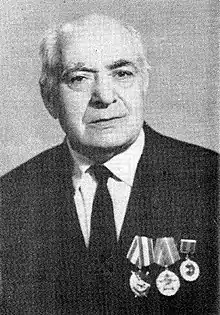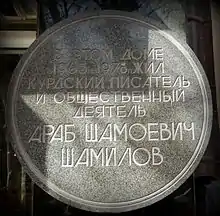Arab Shamilov
Arab Shamilov (Kurdish: Erebê Şemo/Ә'рәб Шамилов or Ereb Shemo) (23 October 1897 – 1978) was a Yazidi Kurdish[1] novelist who lived in the Soviet Union. He was born in the city of Kars in present-day north-eastern Turkey.
Arab Shamoevich Shamilov | |
|---|---|
 | |
| Native name | Erebê Şemo |
| Born | 23 October 1897 Kars Oblast, Russian Empire |
| Died | 21 May 1978 Yerevan, Armenian SSR |
| Occupation | Writer, poet, journalist, interpreter |
| Nationality | Soviet |
| Genre | Novel, story |
| Notable awards | |
| Signature |  |
Early career
During World War I, from 1914 to 1917, he served as an interpreter for the Russian army. Later on, he became a member of the central committee of the Armenian Communist Party. In 1931, he began working on Kurdish literature at the Leningrad Institute of Oriental Studies. He assisted in developing a Latin-based alphabet for the Kurdish language in 1927.[2]
He became a member of the editorial board of the Kurdish newspaper Riya Teze (The New Path), published in Yerevan from 1930 to 1937. In Leningrad, he also met the Kurdish linguist Qenatê Kurdo and published his work as a document about Kurdish language in Armenia.
Literary output
His first and most celebrated work, the story The Kurmanji Shepherd (Şivanê Kurmanca), based on his own life,[2] was published in 1935 (in Russian only after serious censorial edits) and later translated into Italian as Il pastore kurmanji. In 1937, he was exiled by Joseph Stalin and was only allowed to return to Armenia after 19 years, in 1956, following Stalin's death.

In 1959, he published his first Kurmanji novel, Jiyana Bextewer (Жийина бәхтәwар) (meaning: Happy Life) that was then translated into Armenian and later also into Russian (1965). In 1966, he published a historical novel, Dimdim, inspired by the old Kurmanji folk tale of Kela Dimdimê about Dimdim Castle. It has been translated into Italian as well (as Il castello di Dimdim). In 1967, he published a collection of Kurmanji folk stories in Moscow.
Books
- Şivanê Kurmanca, the first Kurdish novel
- Barbang (1958) (published in Yerevan by Haypetrat, 1959)
- Jiyana Bextewar (1959) (re-release: Roja Nû Publishers, 1990, 253 p.)
- Dimdim (1966) (re-release: Roja Nû Publishers, 1983, 205 p.)
- Hopo (1969) (re-release: Roja Nû Publishers, 1990, 208 p.)
See also
References
- Joanna Bocheńska (2018). Rediscovering Kurdistan's Cultures and Identities: The Call of the Cricket. p. 95.
- Galip, Özlem Belçim (2014). "Re-visioning "Kurdistan" and "Diaspora" in Kurdish novelistic discourse in Sweden" (PDF). Nordic Journal of Migration Research. 4 (2): 82–90. doi:10.2478/njmr-2014-0009.
- Avesta Cultural Magazine (in Kurdish)
- Kurdish Literature
- Malpera Mehname
- A Glimpse on the Kurdish Literature in the former Soviet Union
- Il Castello di Dimdim, epopea kurda Autore: Shamilov, Ereb ; traduzione di Shorsh A. Surme, ISBN 88-86051-68-9, 1999
- Shamilov, Arab, "Dastanî Qelay Dimdim", Kurdish Academy of Baghdad, 1975.